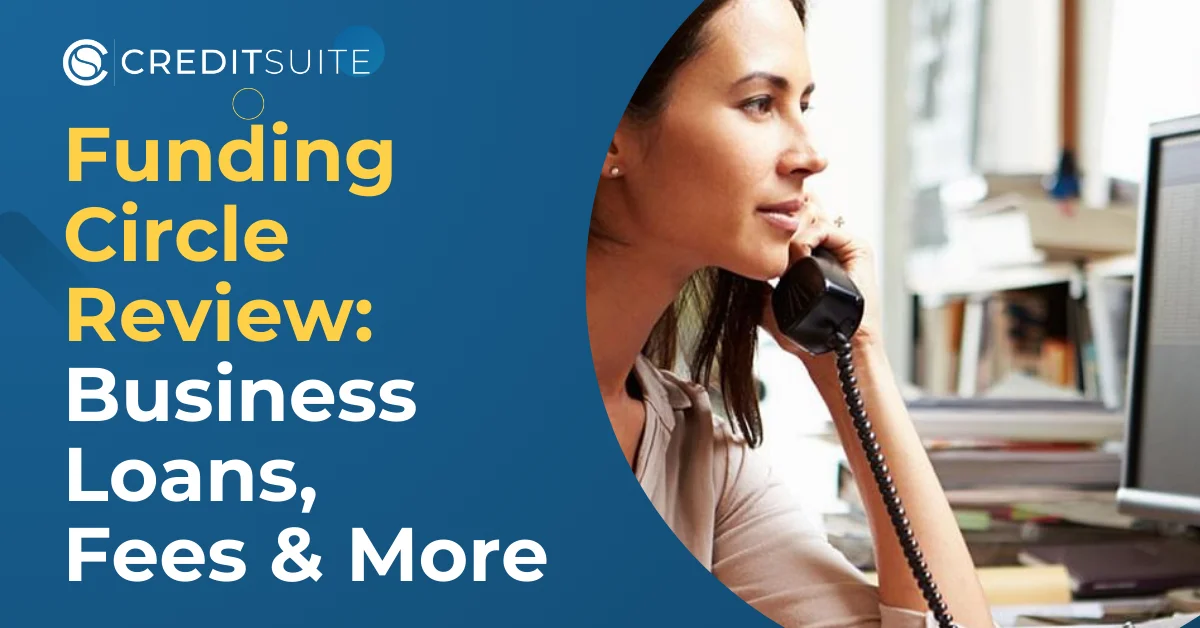Check Out Our Look at Funding Circle, an Online Lender
Funding Circle is one of several lending companies in the online space. They serve as a peer to peer business lender. We look at the specifics and also drill down into the details.
FYI, for more about peer to peer business lending, check out this terrific article from LendEdu. They have a great breakdown and even include a comparison of Funding Circle to Lending Club, Able, and Streetshares.
Background
Funding Circle is online here: www.fundingcircle.com/us/. Their physical addresses are in San Francisco, CA; London and Berlin. You can call them here: (855) 385-5356. Their contact page is here: www.fundingcircle.com/us/about/contact/. They have been in business since 2010.
Funding Circle has a business borrowers’ Bill of Rights, here: www.fundingcircle.com/us/business-borrower-bill-of-rights/
It says:
- The Right to Transparent Pricing and Terms – A borrower has a right to see the cost and terms of any financing you are offered in writing. This in a form that is clear, complete, and easy to compare with other options. It is a bit surprising that more online lenders are not as forthcoming about their fees and rates.
- The Right to Non-Abusive Products – A borrower has a right to loan products that will not force them into expensive cycles of re-borrowing. A lender’s profitability should come from successful repayment, and not the fees and interest collected from defaults. This is good business sense as, unless rates are truly exorbitant (and they are for some lenders in the online space), then it’s going to be more profitable for a lender to get the loan paid back with interest.
Borrower’s Bill of Rights Continued
- The Right to Responsible Underwriting – A borrower has a right to work with lenders who will set a borrower up for success and not failure. High loss rates should not be accepted by lenders simply as a cost of business, which would be passed onto borrowers in the form of high rates or fees. This is generally just good business sense. Unless a lender intends to be in the high risk lending space, a lender would be looking for better credit risks, and that often can mean offering smaller loans as those are more likely to be paid back.
- The Right to Inclusive Credit Access – A borrower has a right to fair and equal treatment when looking for a loan. This is legally required anyway.
- The Right to Fair Collection Practices – If a borrower cannot repay a loan then the borrower has a right to be treated fairly and respectfully throughout the collections process. Collections on defaulted loans should not be used by lenders as their main source of repayment. This is required under the Federal Trade Commission’s Fair Debt Collections and Practices Act.
Term Loans
At Funding Circle, borrow $25,000 – $500,000. Decisions come in as little as 24 hours. Get funding in as little as 5 days. Repay on terms from 6 months to 5 years.
Fees
Funding Circle’s rates start at 4.99% per year. There are no prepayment penalties. The specifics are in the below table.
| Term | Interest Rate |
| 6 months | 4.99 – 22.74% |
| 1 year | 7.05 – 23.74% |
| 2 years | 7.35 – 24.74$ |
| 3 years | 7.65 – 25.49% |
| 4 years | 7.95 – 26.24% |
| 5 years | 8.25– 26.99% |
They charge origination fees of .99% – 6.99%. In addition, their late fee is 10% of the missed payment. There is also a $35 NSF fee.
Advantages
So the advantages include no prepayment penalty. There are also relatively fast decisions and funding. In addition, the Borrowers’ Bill of Rights is encouraging.
Disadvantages
So what are Funding Circle’s disadvantages? It should be obvious: fees, fees, and more fees. They are for origination, missing payments, and also for insufficient funds. Some maximum rates are high!
An Alternative to Funding Circle
Of course one great alternative to Funding Circle is to build business credit. But how do you do that? Fortunately, we have the method right here. And we’re more than happy to let you in on the secret.
Corporate credit is credit in a small business’s name. It doesn’t connect to a business owner’s personal credit, not even if the owner is a sole proprietor and the only employee of the business. Accordingly, an entrepreneur’s business and personal credit scores can be very different.
The Advantages
Because small business credit is separate from individual, it helps to protect a small business owner’s personal assets, in the event of legal action or business insolvency. Also, with two separate credit scores, an entrepreneur can get two different cards from the same vendor. This effectively doubles buying power.
Another benefit is that even startups can do this. Visiting a bank for a business loan can be a formula for disappointment. But building business credit, when done the right way, is a plan for success.
Individual credit scores rely on payments but also other components like credit usage percentages. But for company credit, the scores actually only hinge on whether a company pays its bills in a timely manner.
The Process
Growing small business credit is a process, and it does not happen automatically. A corporation must proactively work to establish corporate credit. Having said that, it can be accomplished readily and quickly, and it is much more efficient than establishing individual credit scores. Merchants are a big part of this process.
Performing the steps out of order will cause repetitive denials. No one can start at the top with company credit.
Company Fundability™
A business needs to be Fundable to loan providers and vendors. For this reason, a business will need a professional-looking website and e-mail address, with website hosting bought from a supplier like GoDaddy. And company phone numbers need to have a listing on ListYourself.net.
In addition the business telephone number should be toll-free (800 exchange or the like).
A corporation will also need a bank account devoted strictly to it, and it must have all of the licenses necessary for running. These licenses all must be in the specific, correct name of the company, with the same company address and telephone numbers. Bear in mind that this means not just state licenses, but possibly also city licenses.
Working with the Internal Revenue Service
Visit the IRS website and acquire an EIN for the small business. They’re totally free. Choose a business entity such as corporation, LLC, etc. A business can start off as a sole proprietor but should change to a kind of corporation or LLC to decrease risk and maximize tax benefits.
A business entity will matter when it concerns tax obligations and liability in the event of litigation. A sole proprietorship means the entrepreneur is it when it comes to liability and tax obligations. Nobody else is responsible.
Starting Off the Business Credit Reporting Process
Begin at the D&B web site and get a free DUNS number. A DUNS number is how D&B gets a business in their system, to generate a PAYDEX score. If there is no DUNS number, then there is no record and no PAYDEX score.
Once in D&B’s system, search Equifax and Experian’s websites for the corporation. You can do this at https://www.creditsuite.com/reports/. If there is a record with them, check it for accuracy and completeness. If there are no records with them, go to the next step in the process. By doing this, Experian and Equifax will have activity to report on.
Trade Lines
First you must establish trade lines that report. This is also called vendor accounts. Then you’ll have an established credit profile, and you’ll get a business credit score.
And with an established business credit profile and score you can begin getting more credit.
These varieties of accounts have the tendency to be for the things bought all the time, like shipping boxes, outdoor work wear, and office furniture.
But first of all, what is trade credit? These trade lines are creditors who will give you initial credit when you have none now. Terms are often Net 30, versus revolving.
Hence if you get approval for $1,000 in vendor credit and use all of it, you will need to pay that money back in a set term, such as within 30 days on a Net 30 account.
Details
Net 30 accounts must be paid in full within 30 days. 60 accounts must be paid in full within 60 days. Compared to with revolving accounts, you have a set time when you have to pay back what you borrowed or the credit you made use of.
To launch your business credit profile properly, you need to get approval for vendor accounts that report to the business credit reporting agencies. Once that’s done, you can then make use of the credit.
Then pay back what you used, and the account is on report to Dun & Bradstreet, Experian, or Equifax.
Not every vendor can help like true starter credit can. These are vendors that will grant an approval with minimal effort. You also need them to be reporting to one or more of the big three CRAs: Dun & Bradstreet, Equifax, and Experian.
Accounts That Don’t Report
Non-Reporting Trade Accounts can also be helpful. While you do want trade accounts to report to at least one of the CRAs, a trade account which does not report can yet be of some worth. You can always ask non-reporting accounts for trade references. And credit accounts of any sort ought to help you to better even out business expenses, thus making financial planning simpler. These are providers like PayPal Credit, T-Mobile, and Best Buy.
Monitor Your Business Credit
Know what is happening with your credit. Make sure it is being reported and deal with any mistakes ASAP. Get in the habit of checking credit reports. Dig into the specifics, not just the scores.
We can help you monitor business credit at Experian, Equifax, and D&B for a lot less. Update the relevant information if there are errors or the data is incomplete.
Disputing Errors
So, what’s all this monitoring for? It’s to challenge any mistakes in your records. Mistakes in your credit report(s) can be corrected.
Disputing credit report errors typically means you precisely spell out any charges you contest.
A Word about Building Business Credit
Always use credit smartly! Never borrow beyond what you can pay off. Track balances and deadlines for repayments. Paying off punctually and in full will do more to elevate business credit scores than almost anything else.
Growing business credit pays off. Excellent business credit scores help a business get loans. Your creditor knows the business can pay its financial obligations. They recognize the small business is for real. The small business’s EIN attaches to high scores, and creditors won’t feel the need to require a personal guarantee.
Business credit is an asset which can help your small business for years to come.
Takeaways
Fees are high at Funding Circle, but at least they’re being transparent about them. However, interest rates increase as terms get longer, although there is no prepayment penalty. Hence Funding Circle is best for companies which do not need to borrow much and can pay it all back not only on time, but early. Borrowers which need more time to pay a loan back would probably do better elsewhere.
Finally, read the fine print and do the math. Therefore, go over details carefully. And decide if this option will be good for you and your company. In addition, consider alternative financing options beyond lending. This includes building business credit, to best get the money you need. Today, we want to hear from our audience! Share your voice with us about your experiences with online lenders.

